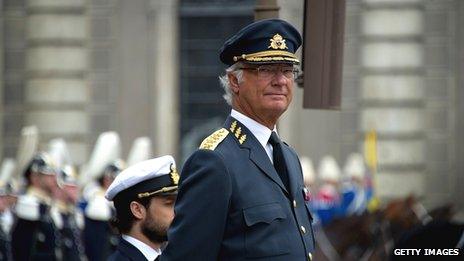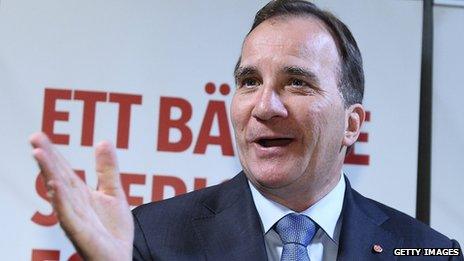Sweden profile - Leaders
- Published
King: Carl XVI Gustaf

Sweden's king fulfils a purely ceremonial role
King Carl XVI Gustaf ascended the throne in 1973, on the death of his grandfather Gustaf VI Adolf. The current king's father died in a plane crash in 1947, when Carl Gustav was only nine months old.
During his long royal apprenticeship, Carl Gustav underwent the usual military training, but also studied history, politics and economics at Swedish universities, served in the diplomatic corps, and worked in banking and commerce.
Constitutional changes in 1974 deprived the king of all but ceremonial duties, such as opening parliament and representing Sweden at the diplomatic level.
King Carl XVI Gustaf is best known abroad for presenting the annual Nobel Prizes.
He married in 1976, and he and Queen Silvia have three children, the eldest of whom - Princess Victoria - is heir to the throne.
Prime minister: Stefan Lofven

Former union boss Stefan Lofven heads a minority, centre-left coalition government made up of his Social Democrats and the Green Party.
He put together the coalition after parliamentary elections of September 2014, in which his party gained 31% of the votes and the Greens 7%.
One of the first announcements he made was that his government would recognise Palestine as a state, prompting a rebuke from Washington. Sweden would be the first European Union country to recognise Palestine as a state.
He said his party and the Greens had agreed to freeze nuclear energy development.
He promised he would seek wide support for his plans to boost welfare, schools and jobs.
Mr Lofven was only elected to parliament in the elections which brought him to power.
The former welder headed the Swedish Metalworkers' Union (IF Metall) between 2006 and 2012, when he was elected as leader of the Social Democrats.
Mr Lofven's government replaced the Alliance for Sweden, a centre-right coalition headed by Moderate Party leader Fredrik Reinfeldt, which came to power at elections in September 2006, ending 10 years of rule by the Social Democrat Party.
His government faced its first major challenge just three months into office, when it lost a budget vote and it seemed the country would face snap elections.
Mr Lofven managed to salvage the situation, striking a deal with the mainstream opposition that averted an early poll and was also seen as countering the rising influence of the far right.